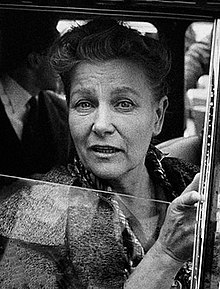Yekaterina Furtseva
| Yekaterina Furtseva Екатерина Фурцева |
|
|---|---|

Yekaterina Furtseva in 1964
|
|
| Minister of Culture | |
|
In office 4 May 1960 – 24 October 1974 |
|
| Premier |
Nikita Khrushchev Alexei Kosygin |
| Preceded by | Nikolai Mikhailov |
| Succeeded by | Pyotr Demichev |
| First Secretary of the Moscow City Party Committee | |
|
In office 17 November 1954 – 30 June 1957 |
|
| Preceded by | Ivan Kapitonov |
| Succeeded by | Vladimir Ustinov |
| Full member of the 20th Presidium | |
|
In office 29 June 1957 – 31 October 1961 |
|
| Candidate member of the 20th Presidium | |
|
In office 27 February 1956 – 29 June 1957 |
|
| Member of the 20th Secretariat | |
|
In office 27 February 1956 – 4 May 1960 |
|
| Personal details | |
| Born |
24 November 1910 Vyshny Volochyok, Tver Governorate, Russian Empire |
| Died | 24 October 1974 (aged 63) Moscow, Russian SFSR, Soviet Union |
| Nationality | Soviet |
| Political party | Communist Party of the Soviet Union |
| Profession | Civil servant |
Yekaterina Alexeyevna Furtseva (Russian: Екатерина Алексеевна Фурцева; 7 December 1910 – 24 October 1974) was probably the most influential woman in Soviet politics and the second woman to be admitted into Politburo of the Central Committee of the Communist Party of the Soviet Union (the first being Yelena Stasova, member of the 7th Bureau).
Furtseva was born in Vyshny Volochyok. Until the 1940s, she worked as an ordinary weaver at one of Moscow's textile factories. She had been a minor party worker in Kursk and the Crimea, and was called to Moscow and sent to the Institute of Chemical Technology from where she graduated in 1941 as a chemical engineer. Furtseva's party career started under Joseph Stalin. Gradually, she became active in Komsomol affairs and rose to the position of Secretary of the Moscow City Council in 1950. She gave a speech at the 19th Congress of the CPSU in 1952, the last party congress of the Stalin era, where she was also elected a candidate member of the Central Committee of the CPSU. Under Nikita Khrushchev, who sympathized with her, Furtseva was the first secretary of Moscow Committee of the CPSU from 1954 to 1957.
In 1952, Furtseva attacked the leading filmstar, Boris Babochkin, who was famous since starring as Vasily Chapayev. This time Furtseva saw the actor starring in a stageplay, and was enraged by Babochkin's satirical portrayal of the Soviet communist leadership. Her angry article in the Soviet newspaper Pravda called for censorship of Babochkin, while Furtseva furthered her career in the Soviet elite. Then Furtseva personally ordered that all film studios and drama companies of the USSR should refuse Babochkin any jobs, keeping him unemployed.
...
Wikipedia
